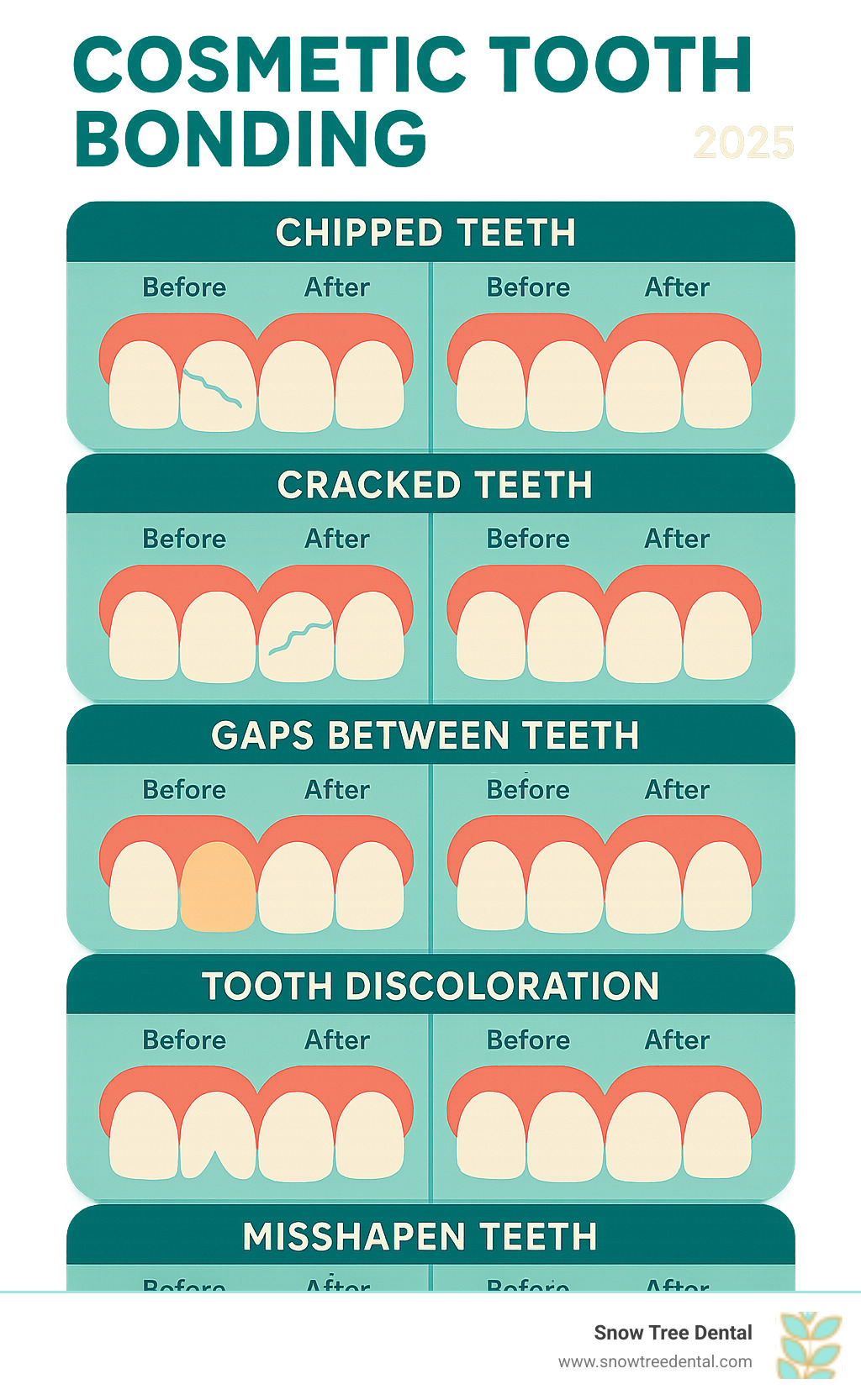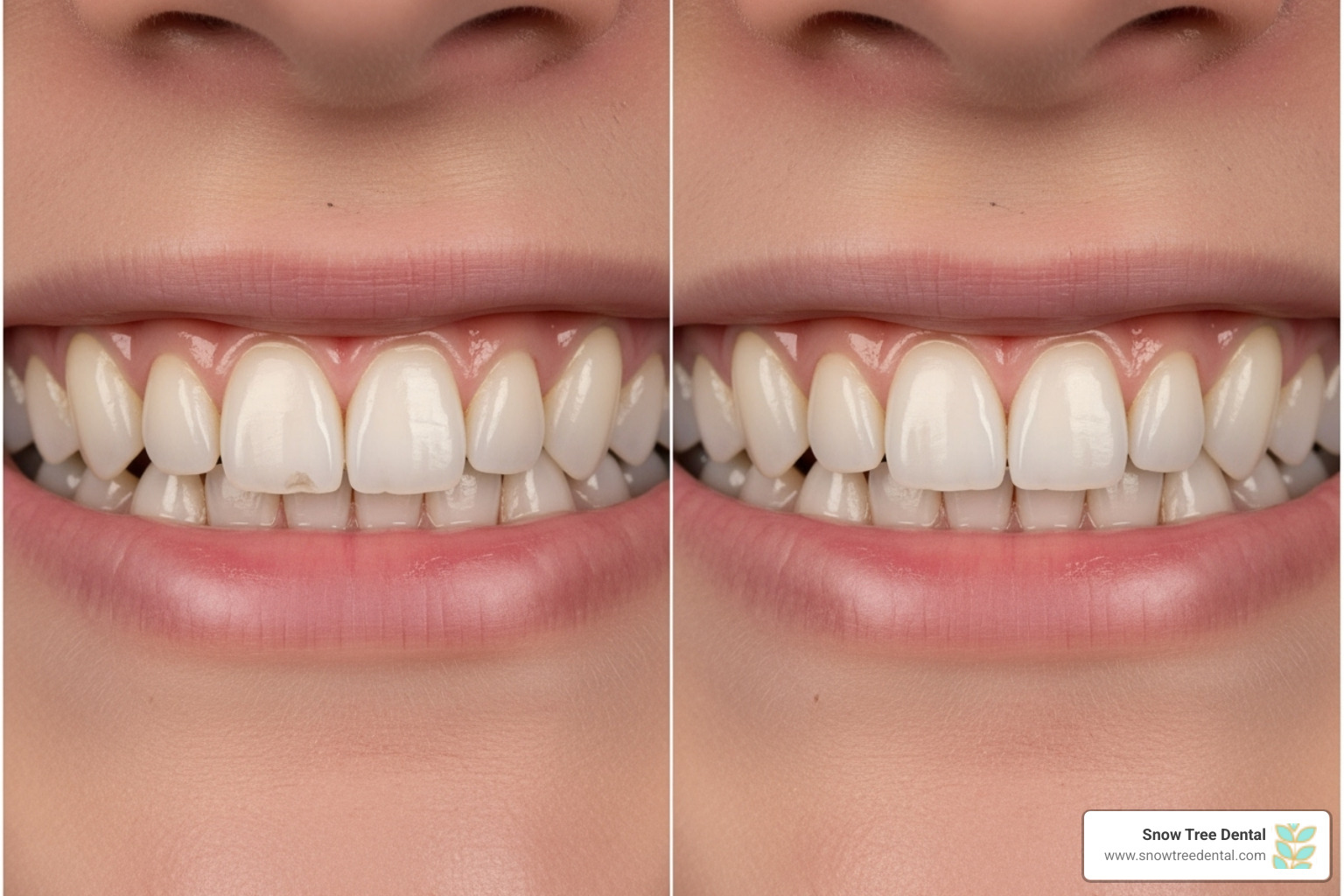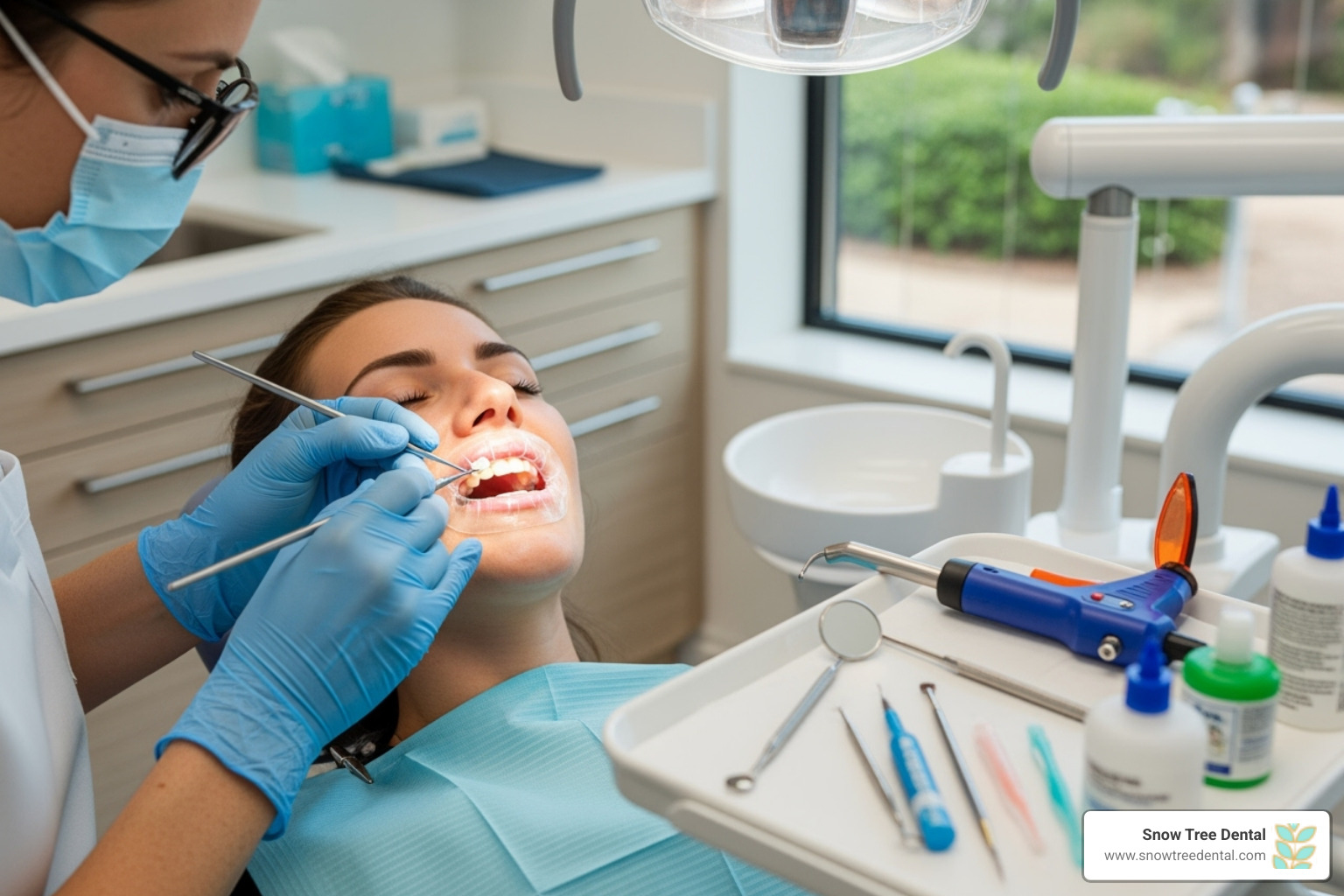Cosmetic Tooth Bonding: Unlock Perfect Smile 2025
Why Cosmetic Tooth Bonding Is the Perfect Smile Solution
Cosmetic tooth bonding is a simple, affordable dental procedure that uses tooth-colored composite resin to fix chips, cracks, gaps, and discoloration in just one visit. This minimally invasive treatment can transform your smile without the cost or complexity of veneers or crowns.
What cosmetic tooth bonding can fix:
- Chipped or cracked teeth – Restore damaged enamel
- Gaps between teeth – Close small spaces for a uniform smile
- Tooth discoloration – Cover stains that won’t whiten
- Misshapen teeth – Reshape teeth for better proportions
- Worn tooth edges – Rebuild and lengthen teeth
Key benefits:
- Fast: 30-60 minutes per tooth
- Affordable: $300-$600 per tooth on average
- Painless: Usually no anesthesia needed
- Reversible: Can be removed without damaging teeth
- Natural-looking: Matches your existing tooth color
The procedure involves applying a putty-like resin to your tooth, shaping it to perfection, then hardening it with a special light. Most patients see immediate results and can eat normally right after treatment.
As Dr. Muna Mohammad at Snow Tree Dental in Houston, I’ve helped countless patients achieve their dream smiles through cosmetic tooth bonding procedures that fit their budget and lifestyle. My approach focuses on creating natural-looking results that boost confidence while preserving your tooth structure.
What Can Dental Bonding Fix and Who Is a Good Candidate?
If you’re unhappy with minor imperfections in your smile, cosmetic tooth bonding offers a versatile and effective solution. It’s a less invasive path to a confident smile, capable of fixing a range of common dental issues.
We frequently use cosmetic tooth bonding to address:
- Chipped or Cracked Teeth: Bonding can seamlessly restore the natural shape of a chipped tooth or seal minor cracks to prevent further damage.
- Gaps Between Teeth: Small spaces between teeth can be easily closed with bonding, creating a more uniform smile, often more quickly than orthodontics.
- Tooth Discoloration: Bonding can cover deep or intrinsic stains that don’t respond to traditional whitening methods.
- Misshapen Teeth: We can reshape short, pointed, or otherwise misshapen teeth to improve symmetry and create a more harmonious smile.
- Exposed Tooth Roots: In cases of gum recession, bonding can be applied to exposed tooth roots to protect them and reduce sensitivity.
For more information about how we can improve your smile, explore our comprehensive services: More info about our cosmetic dentistry services.
What is Cosmetic Tooth Bonding?
Cosmetic tooth bonding is a procedure focused on aesthetic improvements. It involves applying a tooth-colored composite resin material directly onto your tooth. This resin is carefully sculpted by your dentist to achieve the desired shape and size, blending seamlessly with your natural teeth. One of its greatest advantages is efficiency; it’s typically a single-visit treatment that is painless and rarely requires local anesthesia.
Are You an Ideal Candidate for Bonding?
While versatile, bonding isn’t a one-size-fits-all solution. You are likely an ideal candidate if you:
- Have minor cosmetic flaws: Bonding is perfect for small chips, cracks, minor discolorations, or small gaps. More extensive damage may require other treatments like porcelain veneers.
- Have healthy teeth and gums: Any active decay or gum disease must be addressed before cosmetic bonding.
- Have realistic expectations: We’ll discuss what bonding can realistically achieve for your smile during your consultation.
- Are seeking a reversible treatment: Unlike veneers, bonding is minimally invasive and completely reversible, preserving your natural tooth structure. This makes it a great starting point for those exploring cosmetic dentistry.
The Cosmetic Tooth Bonding Procedure: A Step-by-Step Guide
One of the biggest draws of cosmetic tooth bonding is its simple and quick procedure. Most patients can achieve a transformed smile in a single visit, with the process taking just 30 to 60 minutes per tooth.
Here’s a look at the straightforward steps involved:
-
Consultation and Preparation: Your journey begins with a consultation to discuss your goals and ensure your teeth are healthy. We’ll then select the perfect composite resin color using a shade guide to match your natural teeth. If you plan to whiten your teeth, it’s best to do so before your bonding appointment. Preparation is minimal; we simply roughen the tooth surface and apply a conditioning liquid. Anesthesia is rarely needed.
-
Applying the Resin: A putty-like composite resin is applied to the tooth. This is where artistic skill comes into play, as we carefully sculpt and shape the material to fix the imperfection and blend seamlessly with your natural tooth’s contours.
-
Curing the Resin: We use a special curing light to harden the soft resin in seconds. The material is often applied in thin layers, with each layer being cured before the next is added. This technique ensures a strong, durable result.
-
Shaping and Polishing: The final step is to trim, shape, and polish the hardened resin. This ensures the bonded tooth has a natural shine and fits perfectly with your bite, making the restoration virtually undetectable.
Beyond your initial consultation and ensuring your teeth are healthy, no special preparation is needed for your appointment. Just show up ready for your new smile!
For more detailed technical information about the bonding process, you can check out this comprehensive guide: Dental Bonding Procedure Details.
Bonding vs. Other Cosmetic Procedures
When you’re dreaming of a better smile, it’s natural to wonder about all your options. Cosmetic tooth bonding isn’t the only game in town – you might also hear about porcelain veneers or crowns. Each has its place in cosmetic dentistry, but they’re quite different in terms of what they cost, how long they last, and what’s involved in getting them.
Let’s break down how these treatments compare:
| Feature | Cosmetic Tooth Bonding | Porcelain Veneers | Crowns |
|---|---|---|---|
| Cost (per tooth) | $300 – $600 (average) / $200 – $2,000 (range) | $900 – $2,500 | $800 – $3,000 |
| Longevity | 3 – 10 years (typically 5-8 years) | 10 – 20 years | 10 – 30 years or more |
| Procedure Time | Single visit (30-60 minutes per tooth) | 2+ visits (preparation, temporary, final placement) | 2+ visits (preparation, temporary, final placement) |
| Invasiveness | Minimally invasive (little to no enamel removal) | Moderately invasive (significant enamel removal) | Highly invasive (substantial tooth reduction) |
| Reversibility | Fully reversible | Irreversible | Irreversible |
| Stain Resistance | Moderate (can stain over time) | High (very stain-resistant) | High (very stain-resistant) |
| Strength | Good, but susceptible to chipping | Very strong, durable | Very strong, protects entire tooth |
| Aesthetics | Good, natural-looking, but can lack translucency of porcelain | Excellent, highly aesthetic, natural translucency | Excellent, natural-looking |
Affordability is where bonding really shines. At Snow Tree Dental, we see many patients who want to improve their smile but aren’t ready for the investment that veneers or crowns require. Bonding gives you dramatic results without the sticker shock.
Durability is where things get interesting. Yes, bonding typically lasts 3 to 10 years compared to the longer lifespan of porcelain options. But here’s the thing – when bonding does need touch-ups, they’re usually quick and affordable. It’s not like starting over from scratch.
The aesthetic results with bonding are genuinely impressive. We can match your natural tooth color so well that even you’ll forget which tooth was treated. Porcelain does have that slight edge in translucency – it catches light just like natural enamel – but for most people, the difference is barely noticeable.
What really sets bonding apart is its reversibility. We’re not permanently altering your teeth like we would with veneers or crowns. If you ever change your mind or want to upgrade to something else later, your natural teeth are still intact underneath.
The Pros and Cons of Cosmetic Tooth Bonding
Let’s be completely honest about what cosmetic tooth bonding can and can’t do. We believe you deserve the full picture before making any decisions about your smile.
The advantages are pretty compelling: bonding is cost-effective – often the most budget-friendly way to transform your smile. It’s fast – you can literally come in on your lunch break and leave with a new smile. The procedure is minimally invasive, preserving almost all of your natural tooth structure, and it’s typically painless with no shots needed. Best of all, it’s reversible and repairable – if something happens down the road, we can usually fix it easily.
But bonding does have some limitations: it’s less durable than porcelain options, especially if you’re tough on your teeth. The material can stain over time, particularly if you’re a coffee lover or wine enthusiast. You might notice some chipping eventually, especially on teeth that do a lot of heavy lifting when you chew. And yes, bonding typically has a shorter lifespan than veneers or crowns – but remember, when it does need refreshing, the process is much simpler and more affordable.
The bottom line? For many of our patients at Snow Tree Dental, bonding hits that sweet spot of great results, reasonable cost, and minimal fuss. It’s not about being the longest-lasting option – it’s about getting you the smile you want in a way that fits your life and budget.
Aftercare, Longevity, and Cost of Bonded Teeth
Once you’ve improved your smile with cosmetic tooth bonding, proper care is key to keeping it looking fantastic. Taking care of bonded teeth isn’t complicated, but the right approach can maximize their appearance and lifespan.
How to Care For Your Bonded Teeth
Caring for bonded teeth is similar to caring for natural teeth, with a few extra precautions:
- Practice Good Oral Hygiene: Brush twice daily with a soft-bristled toothbrush and floss daily to keep your teeth and gums healthy.
- Avoid Hard Foods and Bad Habits: Protect your bonding from chips by avoiding hard foods like ice and hard candy. Also, avoid habits like nail-biting or using your teeth as tools.
- Limit Staining Foods and Drinks: Coffee, tea, and red wine can stain the bonding material over time. Try sipping through a straw or rinsing with water after consumption.
- Schedule Regular Dental Check-ups: Visit us every six months for a professional cleaning and to ensure your bonded teeth are in excellent condition.
For additional guidance on maintaining your bonded teeth, resources like WebMD offer helpful tips: Learn More About Dental Bonding Care.
How Long Does Bonding Last and What Does It Cost?
Cosmetic tooth bonding typically lasts 3 to 10 years, with most patients enjoying their results for about 5 to 8 years before needing a touch-up. Longevity depends on the location of the bonded tooth, your oral habits, and your diet. At Snow Tree Dental, we use high-quality materials and techniques to ensure the most durable result possible.
In terms of cost, bonding is one of the most budget-friendly cosmetic options, averaging $300 to $600 per tooth. The final price depends on the complexity of the case, the number of teeth treated, and your location. Some dental insurance plans may cover a portion of the cost, especially if the bonding is for structural repair. We recommend checking with your provider to understand your benefits.
At Snow Tree Dental, we offer flexible payment options to make your care more manageable. Explore how we can work within your budget: Our Finance Options.
Frequently Asked Questions about Dental Bonding
Here are answers to some of the most common questions we receive about cosmetic tooth bonding at our Houston practice.
Is the dental bonding procedure painful?
No, cosmetic tooth bonding is typically a completely painless procedure. Since we aren’t drilling or removing significant enamel, local anesthesia is usually not necessary. You might feel gentle pressure as we shape the resin, but that’s it. Some patients experience mild, temporary sensitivity to hot or cold after the appointment, which usually fades within a day or two.
Can you whiten bonded teeth?
This is a crucial point: the composite resin used in bonding does not respond to whitening treatments. Your bonded teeth will remain the same shade even if you whiten your natural teeth. For this reason, we always recommend that you whiten your teeth before your bonding appointment. This allows us to match the resin to your newly brightened smile for a seamless, uniform look. If you whiten later, the bonding will need to be replaced to match.
Can dental bonding be removed or repaired?
Yes, one of the best features of cosmetic tooth bonding is that it’s completely reversible and repairable. Unlike veneers, bonding doesn’t permanently alter your tooth structure and can be removed without damage. If your bonded tooth chips or stains over time, it can usually be easily repaired or polished in a single visit. This flexibility makes bonding an excellent, low-commitment option for improving your smile.
Transform Your Smile Today
If you’ve been hiding your smile because of minor imperfections like chips, gaps, or discoloration, cosmetic tooth bonding could be the simple, affordable solution you’ve been looking for. In just one painless, minimally invasive visit, you can achieve a transformed smile that boosts your confidence.
At Snow Tree Dental in Houston, Dr. Muna Mohammad combines technical expertise with an artistic eye to create natural, beautiful bonding results. We understand that every smile is unique, and we’re dedicated to providing personalized care that is both comfortable and efficient.
We make quality dental care accessible and convenient with flexible scheduling, including evening and Saturday appointments, transparent pricing, and an in-house dental plan. There are no surprise bills—just a clear path to the smile you deserve.
Ready to see what cosmetic tooth bonding can do for you? A consultation with our team is the perfect first step. We’ll listen to your goals and create a personalized treatment plan that fits your budget and lifestyle. Your confidence boost is just one appointment away.








